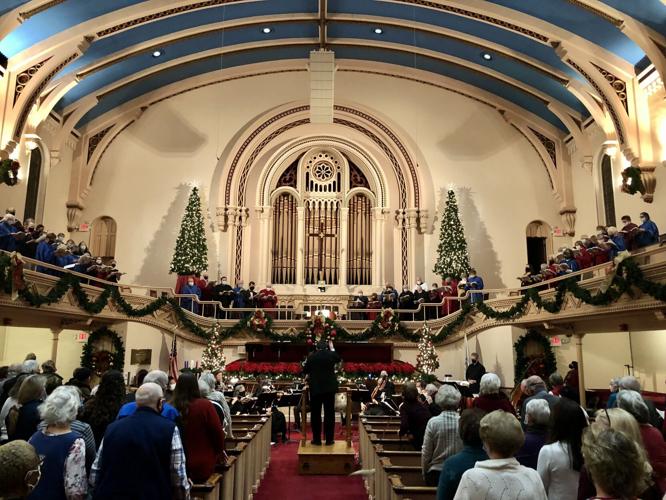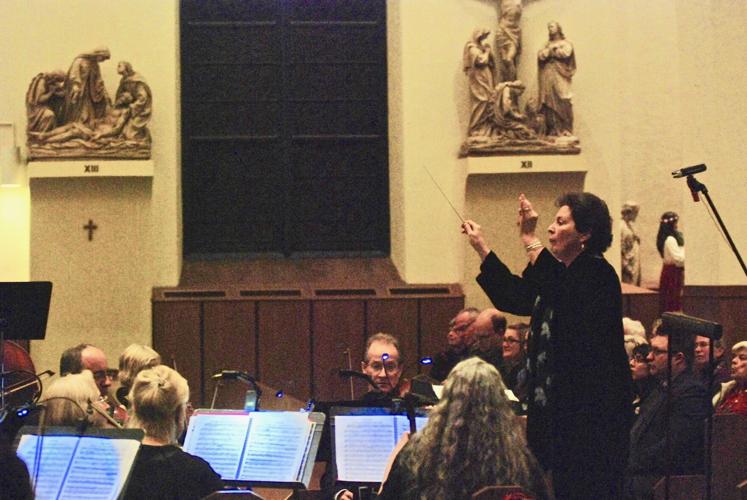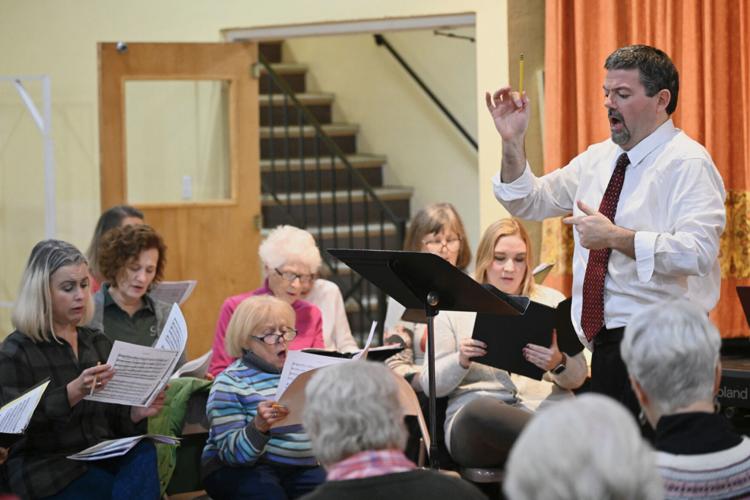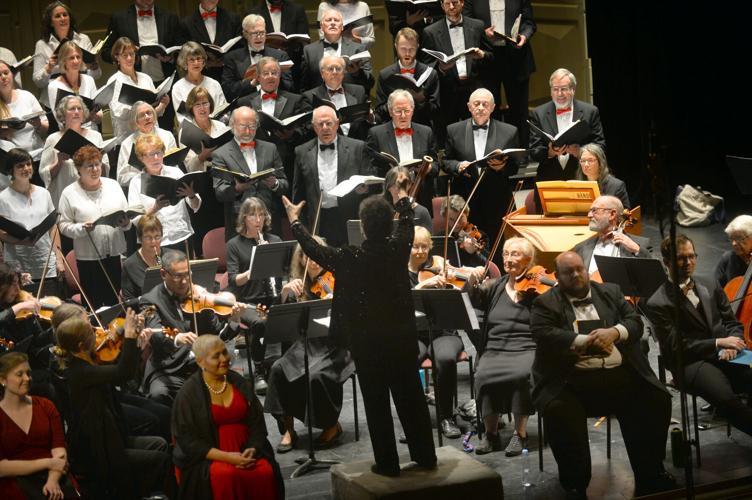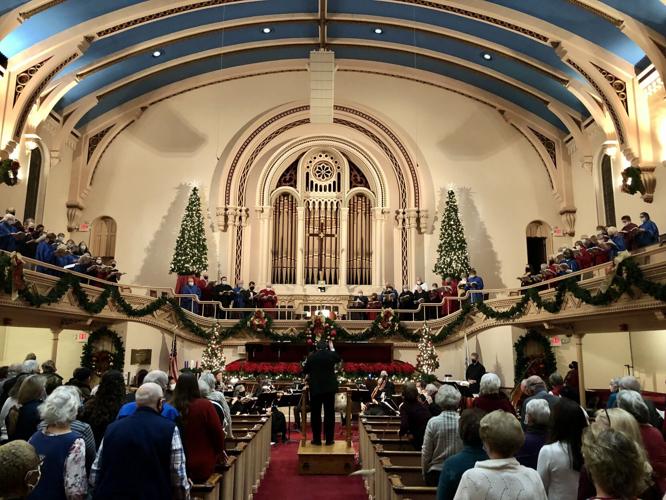George Frederic Handel’s “Messiah” has been a Christmas tradition throughout the world as long as most can remember, despite originally an Easter work. And Vermont is no exception, with longtime annual performances in Montpelier and Barre and Rutland.
“It’s just important,” explains Lisa Jablow, longtime assistant conductor of the Vermont Philharmonic. “The crazier the world gets, the more important positive, affirming traditions become. That’s the beauty and joy of doing ‘Messiah’ every year. It just means an awful lot to the people who come to it — and to the people who participate in it.”
The Vermont Philharmonic and Chorus, conducted by Jablow, will perform Handel’s “Messiah” (Part 1, “Hallelujah” and other choruses, using Mozart’s orchestration), at 7:30 p.m. Friday, Dec. 1, and 2 p.m. Sunday, Dec. 3 at the Barre Opera House. Soloists are soprano Cristina Escobedo, mezzo-soprano Linda Radtke, tenor Adam Hall, and baritone Mason Jarboe. Mary Jane Austin prepared the chorus.
The Rutland Area Chorus and Festival Orchestra, conducted by Alastair Stout, will perform Handel’s “Messiah” (Part 1 and “Hallelujah Chorus”) and the world premiere of Stout’s “Messiah Born: A Festive Overture” at 3:30 and 7 p.m. Sunday, Dec. 3, at Grace Church. Soloists are soprano Evangelia Leontis, mezzo-soprano Amy Frostman, tenor Ryan Mangan and bass Zebulun McLellan.
“For many years, I’ve wanted to add to the Rutland Area Chorus repertoire and produce a festive overture,” says Stout, minister of music at Grace Church for seven years.
“It’s an arrangement and amalgamation of a variety of Advent and Christmas carols,” he said. “I’ve added a big orchestral accompaniment and spiced up the carols here and there, and just had some fun with them to produce a kind of festive, fun, fast, loud Christmas overture.”
“Messiah,” Handel’s greatest work, has become a ubiquitous part of Christmas celebrations worldwide, but only the first third is about the birth of Jesus. Part II covers the death of Christ and the third is focused on the Resurrection and redemption. Originally conceived as a work for Easter, it premiered during the Lent season of 1742.
(Most Christmas performances, including the Philharmonic and Grace Church’s, include only Part I and the “Hallelujah Chorus” from Part II; the Philharmonic also adds numbers from Part III.)
In July 1741, Charles Jennens, a wealthy arts patron and writer, sent Handel a libretto for an oratorio. Jennens compiled the text from the King James Bible, the Coverdale Psalter (an earlier English version of the Bible), and the version of the Psalms from the Book of Common Prayer.
Handel completed the composition of “Messiah” — when performed in its entirety, a three-hour-plus oratorio — in an unbelievable 24 days.
“I think I did see all Heaven before me and the great God himself,” Handel said of composing the work.
The Philharmonic “Messiah” performances, for the second year, will use Wolfgang Amadeus Mozart’s orchestration. Commissioned by Gottfried van Sweiten for performance in Vienna, Mozart re-orchestrated about three-fifths of the work, primarily adding parts for an extended wind section (called “harmonie” at the time) — flutes, clarinets, French horns and trombones. Basically, using Handel’s original vocal lines, Mozart was arranging the work for a Classical orchestra, rather than the Baroque original.
“I’m still having to look down at the score to remember ‘who’s playing in this number?’” Jablow said, with a laugh, of conducting the Mozart version.
“Originally it was just to do something different. It would get more people playing because I have had people in the Philharmonic say, ‘I wish we could do something different so more of us could play.’
“So we did it last year,” Jablow said. “The reason we’re repeating it this year is because we put in all that work last year. The audience response to it was really positive.”
One of the pieces she won’t use the Mozart version for is “The trumpet shall sound” from Part III.
“There’s hardly any trumpet in the Mozart version,” Jablow said. “Obviously Mozart didn’t have a good trumpet player. The whole concert would be lacking something is we didn’t do that number, because it just sets up the end so well.”
Stout and the Rutland Area Chorus are sticking to the original Handel score, but tweaking the parts — improving dynamics and articulation — for a more transparent and exciting performance.
“We have quite a large chorus this year — 85, up from the usual 60,” Stout said. “We’re using a slightly different version of the score, which shows more clearly what I want. During COVID, I rewrote the orchestral parts to make them also very transparent and obvious about what I wanted in terms of dynamics and articulation. Looking at the parts we had been using, I think for the last 70 years, they were just black with markings.
“Obviously I wasn’t changing a note, but adding articulation and dynamics that are really important,” Stout said.
What makes the Rutland performances truly unique is the premiere of Stout’s “Messiah Born: A Festive Overture.”
“We’ve been exploring Bach for the last couple of years, and I obviously want to proceed down that route, but I thought it might be nice to take a year and do something somewhat different,” Stout said.
Commissioned by George Lavallée, a member of the chorus in memory of his aunt, Liliane Lavallée, a mezzo-soprano and graduate of the Vermont Conservatory of Music, “Messiah Born” is based on the traditional Irish “Wexford Carol”: “With Mary holy we should pray / To God with love this Christmas Day / In Bethlehem upon that morn / There was a blessed Messiah born.”
The 10½-minute overture includes parts from familiar carols, including “O Come, O Come, Emmanuel,” “Prepare the Way,” “The Angel Gabriel,” “What Town Is This” and ends with “I Saw Three Ships.”
“A lot of those superimpose quite beautifully on top of each other, so at the very end, you’ll hear at least four or five of those carols piling up on top of each other — and it ends with a huge orchestral and choral sound with the organ being the jewel in the crown,” Stout said. “The organ comes in at the very end with these enormous chords, recapitulating the refrain of ‘O Come, O Come, Emmanuel.’”
For percussion, Stout has added tom toms, cymbals, and for “I Saw Three Ships,” where it talks about “All the bells shall ring,” he has incorporated bell choirs from around the area.
“There’s going to be a lot of sound,” Stout said. “What happens then is the piece ends, and we plunge into the sinfonia of ‘Messiah’ — that movement representing chaos and the world being without leadership. My piece opens up the gates of a huge cosmos.”
jim.lowe@timesargus.com / jim.lowe@rutlandherald.com
Vermont Philharmonic The Vermont Philharmonic and Chorus, conducted by Lisa Jablow, will perform Handel’s “Messiah” (Part 1, “Hallelujah” and other choruses, using Mozart’s orchestration), at 7:30 p.m. Friday, Dec. 1 and 2 p.m. Sunday, Dec. 3 at the Barre Opera House, 6 N. Main St. in Barre. Tickets are $20, $15 for seniors, 5 for students; go online to www.vermontphilharmonic.com
Grace Church Grace Congregational Church presents the Rutland Area Chorus and Festival Orchestra, conducted by Alastair Stout, in Handel’s “Messiah” (Part 1 and “Hallelujah Chorus”) and the world premiere of Stout’s “Messiah Born: A Festive Overture” at 3:30 and 7 p.m. Sunday, Dec. 3 in the church sanctuary, 8 Court St. in Rutland. Admission is by donation (no tickets); for information, call 802-775-4301 or go online to gracechurchvt.org

